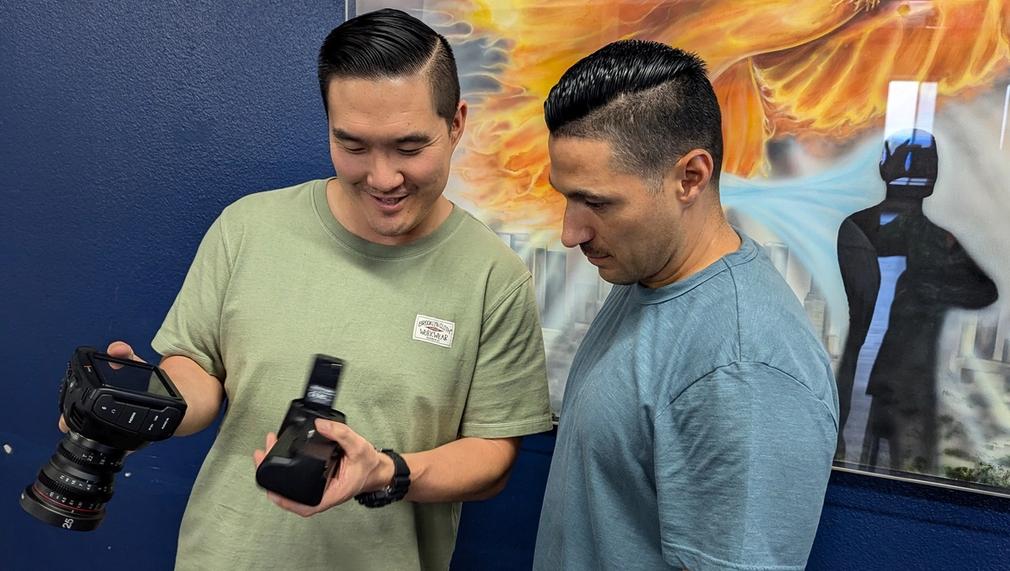Photography classes for formerly incarcerated individuals working in non-profit
This LA2050 grant supports a project that offers photography and photo editing lessons to individuals who have been incarcerated and now work in human services. Non-profit Reentry and prison program organizations need great pictures of their work to reach donors and supporters, as well as to document their efforts. Staff at these organizations are often formerly incarcerated and new to photography. This program, developed specifically for them, would train them to use photography in their work, as well as provide a great skill for a side gig!

What is the primary issue area that your application will impact?
Access to tech and creative industry employment
In what stage of innovation is this project, program, or initiative?
Pilot or new project, program, or initiative (testing or implementing a new idea)
What is your understanding of the issue that you are seeking to address?
Formerly incarcerated individuals are disadvantaged economically, but they also face a great deal of challenges with technology. The organizations who support them and their transitions home are often staffed by others who have been home a bit longer. Because of this, it is rare to find internal staff at these organizations who have experience with photography or with chronicling the work that is being done there. Learning photography and editing is a great opportunity to not only enrich the work of the organizations, but to enhance the ability of formerly incarcerated students to find work on the side, develop artistic expression through this medium, and to chronicle their own journeys as they return to society and rebuild a life here in Los Angeles County. This would address not only the needs of many reentry organizations in Los Angeles, but also increase the understanding of technology for all of the participants and allow them to tell the stories of their own journeys in pictures.
Describe the project, program, or initiative this grant will support to address the issue.
This program would offer a series of 3 ten-session courses across the year, 5 sessions on photography and 5 sessions on photo editing in each course. All classes will be taught by a professional photographer who has been working in this charitable sector, taking pictures both inside and outside of prison for the last several years. The photographer will also have a teaching assistant who is formerly incarcerated. Nonprofit organizations who work in prisons or with Returning Citizens across the county will be invited to send one or two of their staff who have an interest in learning more about becoming a great photographer to the classes. For each course, a starter camera and equipment will be provided for each student, and at the end of the course, the student will be able to keep the camera to use for their work and to create opportunities for income for themselves. The program will accept up to 10 students per course, for a total of 30 students across the year. This program will culminate in an exhibition of the students' work, chronicling their and their peers' experiences transitioning back to life outside incarceration and/or the work of the organizations they work for. This exhibition will highlight the artistic vision of the students and their learned skills in the course, as well as provide a visceral view of individuals' beautiful and trying transitions back to society.
Describe how Los Angeles County will be different if your work is successful.
This program will train up to 30 formerly incarcerated individuals in an artform that will allow them to tell their own stories and the stories of the individuals they are now serving in their work. In addition, it will provide these staff of non-profit organizations valuable skills to be able to highlight the work that these organizations are doing and to highlight the great need in Los Angeles County for these services to continue and to be supported. The exhibition of the students' artwork (photos) will allow attendees to gain insight into how difficult it is to be separated from loved ones and community for so long and what the process of reintegrating takes, in addition to seeing how beautiful it can be at the same time. If this program is successful, we hope that organizations in other parts of California and the country will emulate it, and we hope that we can provide it again on a regular basis.
What evidence do you have that this project, program, or initiative is or will be successful, and how will you define and measure success?
The success of this program will be measured by the interest in participation and by the follow-through of the participants. If we fill the roster each time we offer the course, we know that it is a need in the county that wasn't being met and that Returning Citizens are interested in learning more about this technology and artform. The output of the students will also be a measure of success. We are hopeful that students will use their skills to chronicle the stories they see around them, and in turn, we hope that we can then create a moving exhibition that will enlighten attendees and change minds and hearts about the criminal justice system.
Approximately how many people will be impacted by this project, program, or initiative?
Direct Impact: 32.0
Indirect Impact: 2,500.0